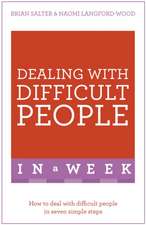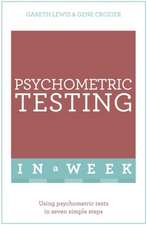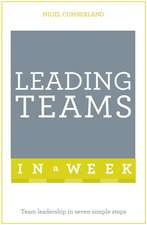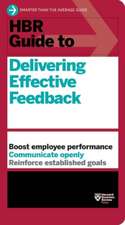irs Managing Conflict in the Workplace
Editat de Heather Falconer, Mike Bagshawen Limba Engleză Paperback – 15 apr 2004
Bullying is now a key complaint received by HR departments. Destructive conflict creates stress, which can lead to poor morale and performance, increased staff turnover and an overall decline in organisational effectiveness.
The good news is destructive conflict can be reduced – but this is a sensitive issue, requiring managers to call on tried and tested techniques.
Published for HR and line managers, IRS Managing Conflict in the Workplace will help employers to recognise and resolve destructive conflict issues more effectively, enabling them to become more positive, productive and efficient. It gives invaluable advice on conflict prevention, mediation and negotiation; it explains how to manage conflict in a wide variety of situations; and includes guidance on the new statutory requirements for disciplinary and grievance procedures.
The handbook will enable HR professionals to:
• recognise the sectors, departments and types of individuals most prone to conflict
• measure the costs of conflict
• understand and comply with the law on the employer’s duty of care
• spot potential problems, recognise bullying behaviours, understand the difference between constructive conflict and bullying and harassment, conduct a risk assessment and take preventative action
• establish, communicate and monitor effective policies and procedures
• train staff and managers in how to manage conflict effectively
• reach agreement through negotiation
• use conciliation and mediation to resolve difficult situations
Also included is best practice advice, sample conflict management policies, case studies, checklists and legal compliance.
Preț: 320.73 lei
Preț vechi: 453.41 lei
-29% Nou
Puncte Express: 481
Preț estimativ în valută:
61.37€ • 64.08$ • 50.79£
61.37€ • 64.08$ • 50.79£
Carte tipărită la comandă
Livrare economică 29 martie-12 aprilie
Preluare comenzi: 021 569.72.76
Specificații
ISBN-13: 9780754523925
ISBN-10: 0754523926
Pagini: 182
Dimensiuni: 178 x 254 x 10 mm
Greutate: 0.34 kg
Ediția:1
Editura: Taylor & Francis
Colecția Routledge
Locul publicării:Oxford, United Kingdom
ISBN-10: 0754523926
Pagini: 182
Dimensiuni: 178 x 254 x 10 mm
Greutate: 0.34 kg
Ediția:1
Editura: Taylor & Francis
Colecția Routledge
Locul publicării:Oxford, United Kingdom
Public țintă
Professional Practice & DevelopmentCuprins
Chapter 1 Conflict in the Workplace, Heather Falconer, Mike Bagshaw; Chapter 2 The Causes of Workplace Conflict, Dave Liddell; Chapter 3 The Costs of Conflict, Marion McCrindle; Chapter 4 Recognising the Danger Signs, Diane Hall; Chapter 5 The Employer’s Duty of Care: The Law, Heather Falconer; Chapter 6 Establishing Effective Policies, Heather Falconer; Chapter 7 ConfIict Management Training, Mike Bagshaw; Chapter 8 Reaching Agreement in Cases of Conflict: The Role of Mediation, Dave Liddell;
Descriere
Conflict, bullying and harassment can destroy the foundations of the most enterprising organisations.
Bullying is now a key complaint received by HR departments. Destructive conflict creates stress, which can lead to poor morale and performance, increased staff turnover and an overall decline in organisational effectiveness.
The good news is destructive conflict can be reduced – but this is a sensitive issue, requiring managers to call on tried and tested techniques.
Published for HR and line managers, IRS Managing Conflict in the Workplace will help employers to recognise and resolve destructive conflict issues more effectively, enabling them to become more positive, productive and efficient. It gives invaluable advice on conflict prevention, mediation and negotiation; it explains how to manage conflict in a wide variety of situations; and includes guidance on the new statutory requirements for disciplinary and grievance procedures.
The handbook will enable HR professionals to:
• recognise the sectors, departments and types of individuals most prone to conflict
• measure the costs of conflict
• understand and comply with the law on the employer’s duty of care
• spot potential problems, recognise bullying behaviours, understand the difference between constructive conflict and bullying and harassment, conduct a risk assessment and take preventative action
• establish, communicate and monitor effective policies and procedures
• train staff and managers in how to manage conflict effectively
• reach agreement through negotiation
• use conciliation and mediation to resolve difficult situations
Also included is best practice advice, sample conflict management policies, case studies, checklists and legal compliance.
Bullying is now a key complaint received by HR departments. Destructive conflict creates stress, which can lead to poor morale and performance, increased staff turnover and an overall decline in organisational effectiveness.
The good news is destructive conflict can be reduced – but this is a sensitive issue, requiring managers to call on tried and tested techniques.
Published for HR and line managers, IRS Managing Conflict in the Workplace will help employers to recognise and resolve destructive conflict issues more effectively, enabling them to become more positive, productive and efficient. It gives invaluable advice on conflict prevention, mediation and negotiation; it explains how to manage conflict in a wide variety of situations; and includes guidance on the new statutory requirements for disciplinary and grievance procedures.
The handbook will enable HR professionals to:
• recognise the sectors, departments and types of individuals most prone to conflict
• measure the costs of conflict
• understand and comply with the law on the employer’s duty of care
• spot potential problems, recognise bullying behaviours, understand the difference between constructive conflict and bullying and harassment, conduct a risk assessment and take preventative action
• establish, communicate and monitor effective policies and procedures
• train staff and managers in how to manage conflict effectively
• reach agreement through negotiation
• use conciliation and mediation to resolve difficult situations
Also included is best practice advice, sample conflict management policies, case studies, checklists and legal compliance.












